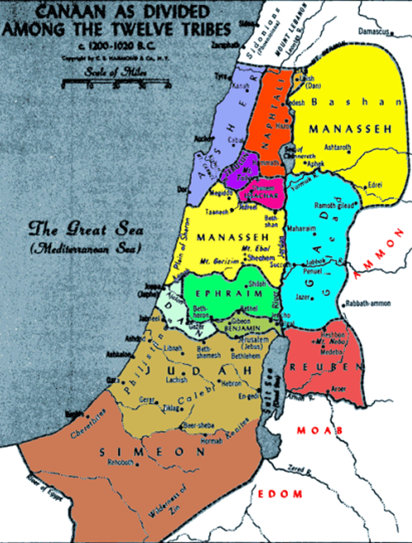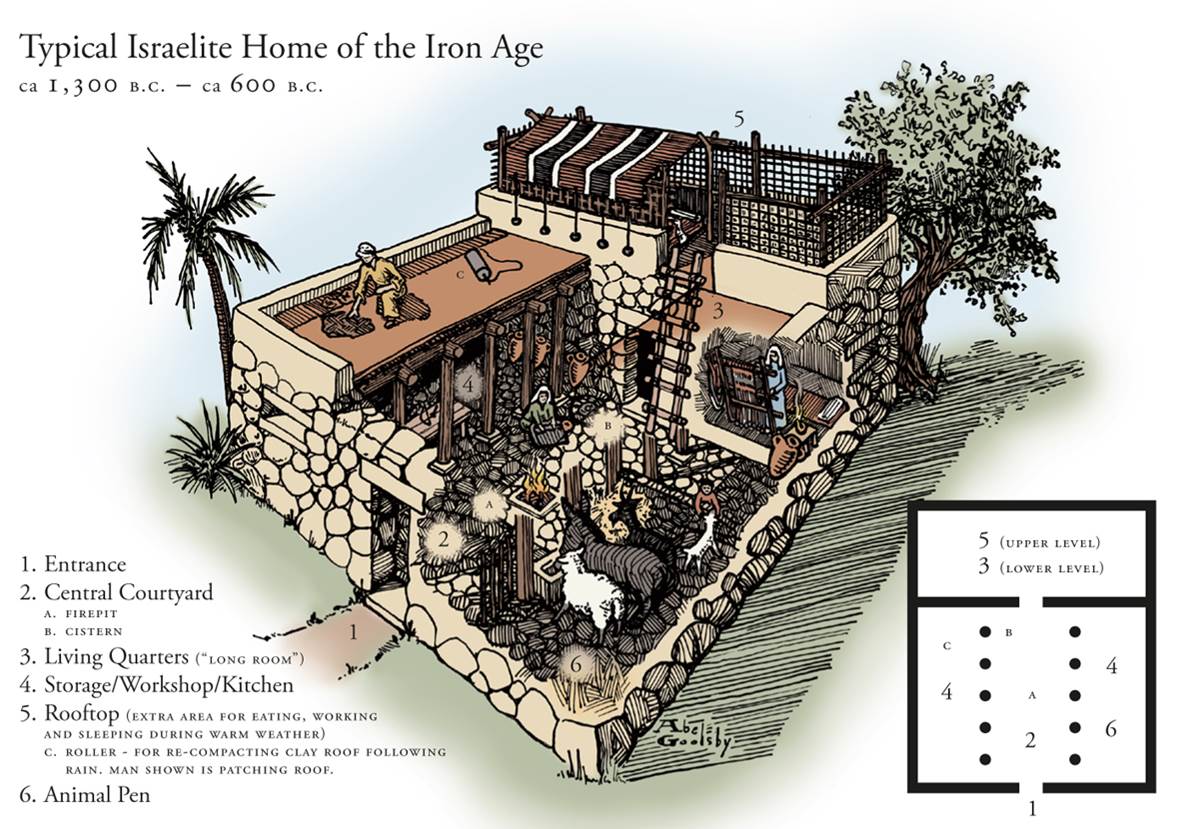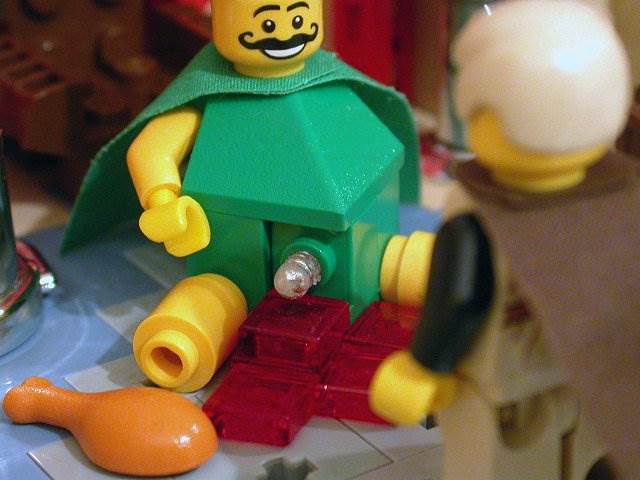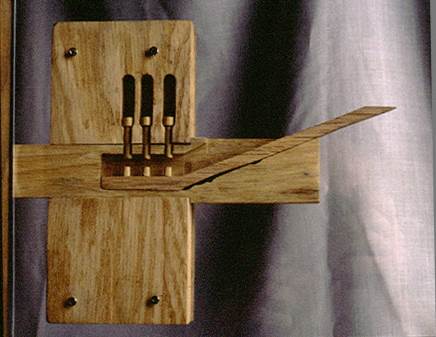Judges 3:12-30 - Ehud.
length: 63:54 - taught on Jan, 25 2017
Class Outline:
Title: Judges 3:12-30 - Ehud.
Announcements / opening prayer:
Darker and darker are the clouds which gather around Israel, and stranger and more unexpected is the deliverance wrought for them. It had begun with Othniel truly a “lion of God.” But after the “lion of God” came one left-handed and deceitful, then the son of an idolater, and then an outlaw of low birth, as if it were ever to descend lower and lower, till the last stage is reached in the Nazarite, Samson, who, as Nazarite, is the typical representative of Israel’s calling and strength, and, as Samson, of Israel’s weakness and spiritual adultery. Deborah is a flower of faith in the midst of them all who was given the gift of prophecy and who didn't question God's call to arms. Yet each period and each deliverance has its characteristic features and high points.
2. Oppression by the Moabites, (3:14), 18 yrs.
Deliverance by Ehud, and rest, (3:30), 80 yrs.
JDG 3:12 Now the sons of Israel again did evil in the sight of the Lord. So the Lord strengthened Eglon the king of Moab against Israel, because they had done evil in the sight of the Lord.
JDG 3:13 And he gathered to himself the sons of Ammon and Amalek; and he went and defeated Israel, and they possessed the city of the palm trees.

Eglon and his assistants overcame any resistance from Reuben and invaded the west, setting up his capital at Jericho, but he did not rebuild it as a fortress; he didn't need to.
If you remember, Jericho was cursed after Joshua conquered it in which God said that no one would ever rebuild it as a fortress in rebuilding its walls.
JOS 6:26 Then Joshua made them take an oath at that time, saying, "Cursed before the Lord is the man who rises up and builds this city Jericho; with the loss of his first-born he shall lay its foundation, and with the loss of his youngest son he shall set up its gates."
A man living in the time of king Ahab violated this order and rebuilt the walls and he lost both his sons.
In his days Hiel the Bethelite built Jericho; he laid its foundations with the loss of Abiram his first-born, and set up its gates with the loss of his youngest son Segub, according to the word of the Lord, which He spoke by Joshua the son of Nun.
Eglon likely rebuilt the area as a city surrounding a palace but without foundations or fortress walls. Since Israel offered no resistance, there was no need for walls anyway.
Moab and Ammon are the grandchildren of Lot. When Lot's daughters got him drunk on two successive nights, they each laid with him and conceived.
Their method of securing their lineage is most Sodom and Gomorrah-ish (where they were raised) and the tribes that came from these children which are the products of rejecting Jehovah are now used by Jehovah to oppress Israel's rejection of Him.
GEN 19:30 And Lot went up from Zoar, and stayed in the mountains, and his two daughters with him; for he was afraid to stay in Zoar; and he stayed in a cave, he and his two daughters.
GEN 19:31 Then the first-born said to the younger, "Our father is old, and there is not a man on earth to come in to us after the manner of the earth.
GEN 19:32 Come, let us make our father drink wine, and let us lie with him, that we may preserve our family through our father."
GEN 19:33 So they made their father drink wine that night, and the first-born went in and lay with her father; and he did not know when she lay down or when she arose.
GEN 19:34 And it came about on the morrow, that the first-born said to the younger, "Behold, I lay last night with my father; let us make him drink wine tonight also; then you go in and lie with him, that we may preserve our family through our father."
GEN 19:35 So they made their father drink wine that night also, and the younger arose and lay with him; and he did not know when she lay down or when she arose.
GEN 19:36 Thus both the daughters of Lot were with child by their father.
GEN 19:37 And the first-born bore a son, and called his name Moab; he is the father of the Moabites to this day.
GEN 19:38 And as for the younger, she also bore a son, and called his name Ben-ammi [son of my kindred; i.e. son of incest]; he is the father of the sons of Ammon to this day.
The reaping of sowing evil may be delayed over a period of time, maybe even years. God uses the descendants of Lot's daughters to oppress Israel.
We have also seen that the king of Moab had hired Balaam to curse Israel.

While Moab remained in the high mountainous region south east of the Dead Sea, Ammon roamed northwards while remaining east of the Jordan. Amelek was a tribe that roamed in the southern Negev. Moses and Joshua had fought and defeated them in the first year of the Exodus and they will continue to harass Israel until the time of Saul.
JDG 3:12 Now the sons of Israel again did evil in the sight of the Lord. So the Lord strengthened Eglon the king of Moab against Israel, because they had done evil in the sight of the Lord.
JDG 3:13 And he gathered to himself the sons of Ammon and Amalek; and he went and defeated Israel, and they possessed the city of the palm trees.
JDG 3:14 And the sons of Israel served Eglon the king of Moab eighteen years.
JDG 3:15 But when the sons of Israel cried to the Lord, the Lord raised up a deliverer for them, Ehud the son of Gera, the Benjamite, a left-handed man. And the sons of Israel sent tribute by him to Eglon the king of Moab.
Literally the Hebrew reads that Ehud was shut up or impeded from using his right hand, and since this idiom is only used here and in JDG 20:16. In the second reference it is to 700 expert slingers of the tribe of Benjamin.
JDG 20:16 Out of all these people 700 choice men were left-handed; each one could sling a stone at a hair and not miss.
The idiom "impeded in the right hand" could mean that the right hand was crippled, but we have to conclude that it is not this and rather refers to being left handed since we couldn't imagine that all 700 of these men were crippled in their right hands.
It seems the Benjamites were known for being ambidextrous, which is ironic since their name means "son of my right hand."
They were equipped with bows, using both the right hand and the left to sling stones and to shoot arrows from the bow; they were Saul's kinsmen from Benjamin.
So Ehud is left handed and this will give him the advantage of binding his dagger on the opposite side to that on which it was usually carried and so conceal it when he enters the presence of the king of Moab, whose guards would have searched his left side for a concealed weapon.
JDG 3:16 And Ehud made himself a sword which had two edges, a cubit in length; and he bound it on his right thigh under his cloak.
So Ehud forged for himself a double edged sword that was about 18 inches long, which he bound to his right thigh in concealment.
JDG 3:17 And he presented the tribute to Eglon king of Moab. Now Eglon was a very fat man.
JDG 3:18 And it came about when he had finished presenting the tribute, that he sent away the people who had carried the tribute.
The tribute is the national tax that the king has put upon Israel which was periodically due. This gave Ehud the occasion to be in the palace. A stranger in the palace paying the tribute would not arouse suspicion. Also, there are more people than Ehud bringing tribute. These may be Israelites from other tribes or foreigners who are also under Eglon's rule. When they are sent away, Ehud can be alone with the king. The king is mentioned as being very fat so that we understand how the dagger can disappear into his body.
JDG 3:19 But he himself turned back from the idols which were at Gilgal, and said, "I have a secret message for you, O king." And he said, "Keep silence." And all who attended him left him.
There is some debate as to whether this is the Gilgal by the Jordan where Israel first camped or is a further place to the northwest where Joshua first set up his headquarters and also as to whether the Hebrew psillim refers to stone quarries or stone statues. In light of the context of the whole book we tend to think psillim refers to sculpted statues which were set up at Gilgal, in the same place that Joshua built an altar of twelve stones and which Israel has allowed to be covered in statues of Baal and Ashteroth.
In either case, Ehud's plan was to leave with the other couriers and then at a safe enough distance to turn back and ask for a private audience with the king and this was granted to him.
Whether Ehud indicates that the secret message should be told to the king in complete private, without any guards or attendants, or if this was a help given by God, since in such a case we would not admit to it just being "good luck," we don't know. It may just be that since Ehud states that the secret message was from God was enough for the king to request complete privacy. The king literally sets up his own trap and the situation is perfect for assassination.

The scene takes place in a room on the roof which would allow the cool evening breezes to come through. This would have been a one room apartment built on the corner of a flat root, fitted on all sides with lattice windows, which shut out the sun in the heat of the day, but allowed for free ventilation during the cool breezes of the late afternoon or evening. It certainly allowed for privacy and it was the coolest room in the house.
JDG 3:20 And Ehud came to him while he was sitting alone in his cool roof chamber. And Ehud said, "I have a message from God for you." And he arose from his seat.
Ehud uses the generic term for God - Elohim - and not Jehovah. Eglon might not have taken the reference to God as the true God.
There is a wonderful rabbinic tradition that Eglon understood Ehud to be referring to the God of Israel and so he stood up as a sign of respect, and for this he is rewarded with Ruth as a daughter (for Ruth is a Moabite). But because of his wickedness he had another daughter, Orpah (who married Naomi's other son) and who became the mother of Goliath. This is fun but it's all based on imagination and has no real foundation.
We cannot tell why the king arose. It may have been to defend himself or just to stretch. It is likely stated so the scene can be set for us.
JDG 3:21 And Ehud stretched out his left hand, took the sword from his right thigh and thrust it into his belly.
JDG 3:22 The handle also went in after the blade, and the fat closed over the blade, for he did not draw the sword out of his belly; and the refuse came out.
There is no cross-shaft at the handle of the blade to stop its penetration and so the entire sword, handle and all, went into him and his fat enclosed around it, but then thirdly, the Hebrew says that the sword "came out behind." The Hebrew parshedona, only used here in the Bible, has cognates in other Semitic languages that refer to the anus. We might picture a downward motion of the thrust of the sword in which the very large body of the king received the entire sword in which the tip protruded from his anus which would have emptied his bowels. Not a pretty picture, but God is purposely painting it for us.
The very one whom God had earlier strengthened against Israel now became reduced to a pile of fat and excrement.

JDG 3:23 Then Ehud went out into the vestibule and shut the doors of the roof chamber behind him, and locked them.
JDG 3:24 When he had gone out, his servants came and looked, and behold, the doors of the roof chamber were locked; and they said, "He is only relieving himself in the cool room."
The door could be locked from the inside without a key.
Servants would not barge in through locked doors. Ehud shows his presence of mind under pressure. This affords him time to escape.
When the servants found the door locked they assumed the king was "covering his feet." This Hebrew euphemism refers to defecation and since the sword cut through the kings intestines the smell probably helped them conclude this. The king is very fat and so sitting on the pot happens often and likely for long periods of time, and so they wait and wait until they get very anxious. This gave Ehud plenty of time to bolt out of there.
JDG 3:25 And they waited until they became anxious; but behold, he did not open the doors of the roof chamber. Therefore they took the key and opened them, and behold, their master had fallen to the floor dead.

The key was a flat piece of wood that was fitted with pins corresponding to the holes in a hollow bolt. The key pushed the pins out of the bolt so that it could be moved. You can see how the door can be locked without a key from the inside.
JDG 3:26 Now Ehud escaped while they were delaying, and he passed by the idols and escaped to Seirah.
We have no idea where this place is. We assume it is somewhere a forested portion of the hills of Ephraim. Passing by the carved statues of the Moabite idols might be a metaphor for the passing the king.
JDG 3:27 And it came about when he had arrived, that he blew the trumpet in the hill country of Ephraim; and the sons of Israel went down with him from the hill country, and he was in front of them.
JDG 3:28 And he said to them, "Pursue them, for the Lord has given your enemies the Moabites into your hands." So they went down after him and seized the fords of the Jordan opposite Moab, and did not allow anyone to cross.
JDG 3:29 And they struck down at that time about ten thousand Moabites, all robust and valiant men; and no one escaped.
JDG 3:30 So Moab was subdued that day under the hand of Israel. And the land was undisturbed for eighty years.
The assassination of Eglon is spread throughout Ephraim and eventually the fighting men of Ephraim came out of the hills and met with Ehud who rallied them to war and they answered the call.
The blow of the horn is the shofar, the rams horn.
"Jehovah has given the Moabites into your hands." Israel recognizes Ehud's leadership and chase the Moabites out of Israel.
The fords are the crossing points of the Jordan. As Ephraim's army descended upon Jericho the Moabite army fled, being leaderless, but where held up at the Jordan where Israel slaughtered them over a period of time.
God's historians are often brief and to the point, as we would expect them to be. It often seems like things happen in a day, but that is not always the case. This campaign against Moab would have taken weeks or months.
This is the longest period of peace in Judges - 80 years.
The deliverance of Ehud leads us to ask if his actions were condoned by Jehovah. Was it Jehovah's will for him to be cunning and then assassinate the king? Does this condone his actions and so condone other assassins as well as the use of lying and cunning methods?
Some are dead set against Ehud's method. One of my favorite biblical historians states that "he needed not cunning and murder to affect deliverance." Almost all bring up the fact that Ehud did not have the Spirit upon him.
Ehud doesn't have the Spirit upon him, nor is it stated that he judged Israel. One cannot use his methods as an excuse for lying and murder, but God did raise him up.
God does not give His judgment of the matter. He does not say anything good or bad about him. So we conclude that we are to approach the moral ability of Ehud in the same way. We leave judgment in the hands of the Lord and we are not so stupid as to think this man's way of delivering Israel condones lying or murder for the cause of God.
We know for sure that it was time for Eglon, king of Moab, to be judged and whether God uses a plague or a fireball or a man of questionable character is not for any of us to judge. Maybe there were no good men in Israel to use.
"Ehud proved himself to have been raised up by the Lord as the deliverer of Israel, simply by the fact that he actually delivered his people from the bondage of the Moabites, and it by no means follows that the means which he selected were either commanded or approved by Jehovah." [Keil and Delitzsch]





